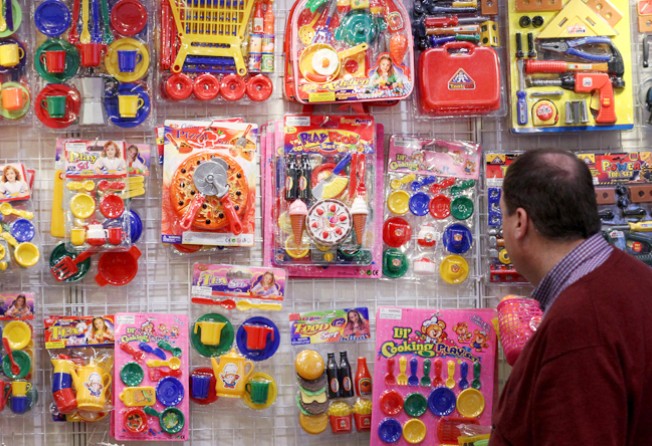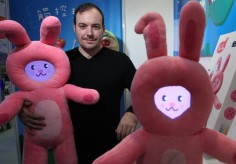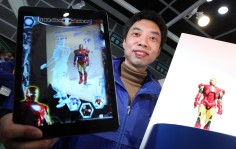Software apps bring new fun at toys and games fair
Products paired with smartphones and tablet computers steal show as conventional manufacturers fight for share of shrinking market

Creators of software applications have parachuted into one of the world's largest toy shows, raising to dizzy heights the bar for conventional toymakers to compete for a slice of a shrinking market.
The new breed of toymakers touting products paired with applications for smartphones and tablet computers made their debut yesterday at the Hong Kong Toys and Games Fair, joining almost 2,000 exhibitors at the four-day event that is marking its 40th year.
In addition to showcasing the latest hot toys, the fair serves as a bellwether for an industry challenged by rising costs, safety issues, technological advancement and the wider use of hand-held electronic devices.
Against this backdrop, some exhibitors of conventional toys are fighting for survival by rejuvenating product designs, adding gimmicks and cutting costs.
"The future is combining applications or social media with conventional toys," said Wilson Chiu, whose Global Manufacturing Partners is an original equipment manufacturer of toys that branched out into applications for the business.
"The toy industry has a future as soon as we OEM firms add value to the traditional business."
His company, which produces toys for brands such as Fisher-Price, Wal-Mart, Toys 'R' Us and PEZ, moved into this new field using augmented reality technology two years ago. It has since built up a team of 17 staff in Hong Kong backing an investment of HK$3 million.
The company launched at the toy fair augmented reality games that children use with smartphones or tablets to interact with images on a T-shirt or with a plastic toy. The games encourage children to touch and interact with the object and play with adults.
Chiu believes the application business has promise outside the toy industry to support promotions at restaurants and convenience stores involving games or coupon redemption.
His company is among many Hong Kong toy manufacturers with production bases in the Pearl River Delta that have been forced to reinvent themselves in the face of rising costs on the mainland that have seen foreign buyers turn to cheaper countries such as Vietnam and Indonesia.

Phone industry veteran Jason Warren has also jumped on the bandwagon of application-driven toys. He quit his job as a smartphone designer with Taiwan's HTC three years ago to start his Roam & Wander applications firm.
Hong Kong-based Warren is showing off at the fair an iPhone-powered pink bunny that children can play with, in addition to taking care of it by "feeding" it.
"Since I designed my first smartphone in 1999, none of today's functions like camera, GPRS and music existed at that time," said Warren, who exhibited for the first time at the toy fair. "Smartphones are eating into the world, and iPads are eating into the toy industry."
Despite the wave of technological advancement sweeping over the industry, conventional toymaker Kai Jal Industrial has chosen to improve product design and cut costs by shrinking space by nearly a third at its Dongguan production base. "The application-oriented toys are still in their infancy. I doubt if they will make any profit out of it," chief Tony Yeung said.
British-based importer Peter Heath said he would spend half of his £6 million(HK$76 million) budget on application-driven toys and the rest on traditional toys.

Thomas Doboin, a French buyer with a budget of €2 million (HK$21 million) at the fair, said fewer children in France were playing with traditional toys, dropping them at an earlier age in favour of smartphones and tablets. The poor economy also meant parents were shopping for cheaper toys, he said.
Hong Kong's toy exports fell 2 per cent to HK$78.82 billion in 2012, after a 4 per cent rise in 2011.